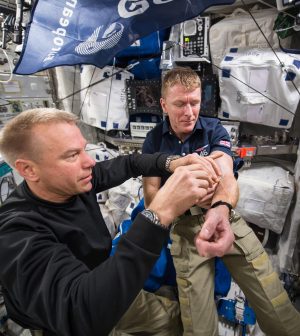- 8 Ways to Increase Dopamine Naturally
- 7 Best Breads for Maintaining Stable Blood Sugar
- Gelatin vs. Collagen: Which is Best for Skin, Nails, and Joints?
- The Long-Term Effects of Daily Turmeric Supplements on Liver Health
- Could Your Grocery Store Meat Be Causing Recurring UTIs?
- Are You Making This Expensive Thermostat Error This Winter?
- Recognizing the Signs of Hypothyroidism
- 10 Strategies to Overcome Insomnia
- Could Artificial Sweeteners Be Aging the Brain Faster?
- Techniques for Soothing Your Nervous System
Crafting Meals for Astronauts: Healthy Dining in Outer Space

Diets higher in fruit, vegetables and omega-3 fatty acids could improve astronaut health during long spaceflights while still sticking to requirements for what can go on board, according to new research.
A new study tested this theory on a spaceflight simulation chamber on Earth with 16 people: 10 men and six women.
Four individuals participated in each 45-day, Earth-based, closed-chamber mission. They either ate a standard astronaut diet or one that was enhanced with more fruits and vegetables, along with more fish and other sources of omega-3 fatty acids.
While the standard spaceflight diet is currently used on the International Space Station, the enhanced diet provided more than six servings of fruits and vegetables a day and between two to three servings of fish a week. It also featured other healthy foods.
The study found the enhanced diet was associated with lower cholesterol levels, lower cortisol levels (suggesting lower stress), and greater cognitive speed, accuracy and attention compared to the standard diet. It was also tied to a more stable microbiome.
The report was published online recently in Scientific Reports.
This enhanced spaceflight diet has significant health and performance benefits, said study author Grace Douglas, advanced food technology lead scientist for NASA in Houston, and colleagues. It may be beneficial for astronauts, even on short space missions, the research team noted in a journal news release.
All of the foods were shelf-stable, which is a must to meet storage conditions on space missions. The food was stored in the chamber before the start of each mission.
Participants provided samples of their saliva, urine, blood and stool, and completed cognitive assessment tasks throughout the missions.
Further investigation is needed to assess healthier diets in space, the study authors concluded.
More information
The U.S. Centers for Disease Control and Prevention has more on nutrition.
SOURCE: Scientific Reports, news release, Dec. 15, 2022
Source: HealthDay
Copyright © 2026 HealthDay. All rights reserved.










